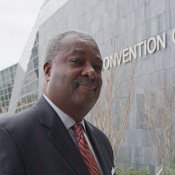At tomorrow's meeting, the Jackson City Council will decide whether to ask the state Legislature to remove a controversial state commission that must now approve how the city spends sales-tax money on safety and infrastructure repairs.
In 2009, Gov. Haley Barbour signed Senate Bill 3268 into law, allowing Jackson voters to decide if the city should impose a maximum 1 percent sales tax increase. If the referendum receives 60 percent approval, the tax increase will help finance the city's fire and police departments, and pay for emergency road and sewer repair.
Food and beverages sales at restaurants, hotel and motel fees, retail food sales and television cable service are exempt from the tax. Legislators estimated in March that the tax could generate about $20 million a year. The law designates 70 percent of that revenue for road repair and 30 percent to hire and maintain police officers and firefighters.
But a nine-member commission must approve expenditures of all revenue from the new tax. Mayor Harvey Johnson Jr. criticized the commission last year, arguing that the commission removed the city's authority from spending money and completing projects expeditiously.
The bill requires Johnson to appoint three members to the commission, with the council's confirmation, while the governor and lieutenant governor appoint two more commission members--both of whom must be city residents. The House speaker gets to appoint a nonvoting, at-large member. Johnson must also appoint three members from "local chamber of commerce" recommendations.
In 2009, Jackson Sen. John Horhn championed the bill, but said he had to make changes to it in order to get it past the Senate, such as adding the commission.
Former Ward 2 Councilman Leslie McLemore said in 2009 that the Senate would not have passed the referendum law without the commission because of the unstable countenance projected by then-Mayor Frank Melton.
Mims said today that the city wants to remove the commission requirement, and to redistribute the proceeds of the local-option sales tax, making water and sewer repairs higher priority.
The amendment would extend the repealer on the sales-tax option indefinitely; it now sunsets in 2014.
"If this passes, it would give us a very short time frame in which to work," Mims said. "We need enough time to issue bonds. If the Legislature does not agree to remove the repealer, we hope they would at least extend it 15 to 20 years so that we could issue bonds specifically for the infrastructure needs we have."
Barbour, who could not be reached for comment this morning, may oppose changes to the legislation extending the repeal date, He said, though, in a March 12 statement that the tax could be extended.
"(A)lthough the bill has a 2014 repealer date, the need for police and fire protection and road and sewer repair will certainly not end in 2014. The repealer could easily be extended by legislative amendment without an additional referendum. Therefore, there is not a definite end to this special tax," Barbour stated. He added that he does not "personally support the bill," but approved it because of its bipartisan support in the House and Senate.



Comments
Use the comment form below to begin a discussion about this content.
comments powered by Disqus